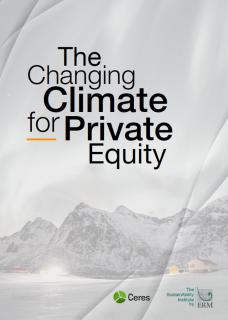
Understanding and awareness of climate-related risks and opportunities have intensified in every corner of the business world in recent years. In finance, the application of Environmental, Social, and Governance (ESG) factors as a lens through which to assess the viability of potential investments have accelerated tremendously. As a result, businesses of all types globally report that investor interests in their ESG performance overall, and in their ability to define and manage climate-related risks and opportunities specifically, are key drivers behind the steps companies are taking to understand and address the climate crisis.
Over the last two decades, private equity has outperformed other asset classes while growing tremendously, adding $US trillions in assets under management. Based on its recent returns and scale, private equity is more attractive and more influential than ever before.
The Changing Climate for Private Equity, a joint research project between the SustainAbility Institute by ERM (the SustainAbility Institute) and Ceres, seeks to understand how deeply climate-related expertise is embedded within private equity firms and to explore what climate performance expectations they impose on the companies in which they invest.
The report outlines the direction of the private equity sector with respect to climate. It is driven by learning derived from in-depth interviews with representatives of 27 top private equity actors and complementary research. It finds the industry facing increasing pressure to align investment activity with carbon reduction targets and other climate-related goals as well as in need of better guidance and tools to support the development and implementation of climate-aligned investment strategies.
